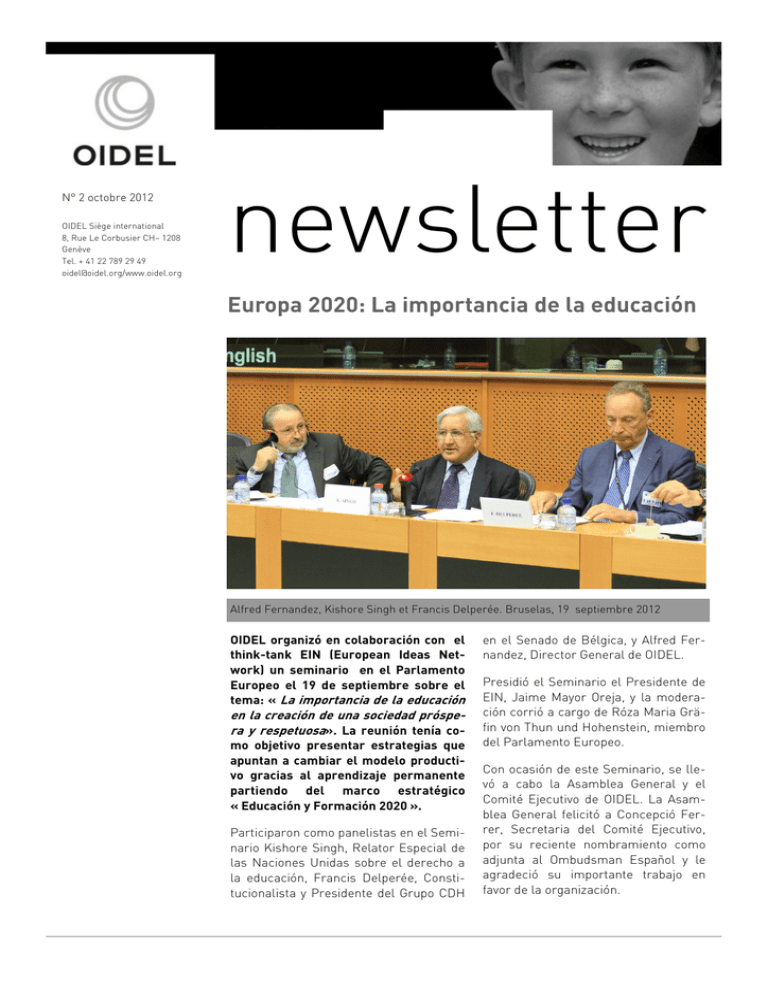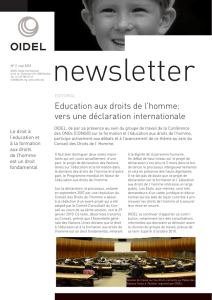Octobre 2012
Anuncio

N° 2 octobre 2012 OIDEL Siège international 8, Rue Le Corbusier CH– 1208 Genève Tel. + 41 22 789 29 49 [email protected]/www.oidel.org newsletter Europa 2020: La importancia de la educación Alfred Fernandez, Kishore Singh et Francis Delperée. Bruselas, 19 septiembre 2012 OIDEL organizó en colaboración con el think-tank EIN (European Ideas Network) un seminario en el Parlamento Europeo el 19 de septiembre sobre el tema: « La importancia de la educación en la creación de una sociedad próspera y respetuosa». La reunión tenía como objetivo presentar estrategias que apuntan a cambiar el modelo productivo gracias al aprendizaje permanente partiendo del marco estratégico « Educación y Formación 2020 ». Participaron como panelistas en el Seminario Kishore Singh, Relator Especial de las Naciones Unidas sobre el derecho a la educación, Francis Delperée, Constitucionalista y Presidente del Grupo CDH en el Senado de Bélgica, y Alfred Fernandez, Director General de OIDEL. Presidió el Seminario el Presidente de EIN, Jaime Mayor Oreja, y la moderación corrió a cargo de Róza Maria Gräfin von Thun und Hohenstein, miembro del Parlamento Europeo. Con ocasión de este Seminario, se llevó a cabo la Asamblea General y el Comité Ejecutivo de OIDEL. La Asamblea General felicitó a Concepció Ferrer, Secretaria del Comité Ejecutivo, por su reciente nombramiento como adjunta al Ombudsman Español y le agradeció su importante trabajo en favor de la organización. Le droit à la liberté de choix éducatif en Europe las instituciones privadas" (par. 5), pero plantea La Asamblea Parlamentaria del Consejo de Europa aprobó ayer por amplia mayoría una resolución sobre el derecho a la libertad de elección en la educación. La resolución toma como punto de partida el artículo 2 del Protocolo Adicional a la Convención Europea de Derechos Humanos según el cual los Estados del Consejo de Europa, en el ejercicio de sus funciones en el ámbito de la educación y la enseñanza debe respetar "el derecho de los padres a asegurar esta educación y esta enseñanza conforme a sus convicciones religiosas y filosóficas". Cabe señalar que el título de la Resolución es significativo ya que habla de "el derecho a la libertad de elección", lo que reafirma la libertad como un derecho fundamental. La Resolución vincula íntimamente la libertad de elección con el derecho a la educación de acuerdo con las recientes sentencias del Tribunal Europeo de Derechos Humanos y considera que "las escuelas que no son administradas por el Estado pueden promover el desarrollo de una educación de calidad y la adecuación de la oferta educativa a la demanda de las familias" (párrafo 3). La resolución exhorta a los Estados a que reconozcan claramente por ley: "el derecho de abrir y administrar instituciones educativas privadas, al menos en la educación primaria y secundaria, la posibilidad de que estas instituciones sean parte de sistema nacional de educación y la oportunidad para los alumnos de obtener los mismos Diplomas que los emitidos en las escuelas públicas "(para. 4). Según el mismo párrafo para reconocer a las escuelas privadas el Estado deberá utilizar criterios objetivos, equitativos y no discriminatorios. La Asamblea Parlamentaria recomienda claramente a los Estados financiar las escuelas no estatales pidiendo que "se aseguren de que fondos suficientes están disponibles para permitir que todos los niños reciban la educación obligatoria en una condición que limita la obligación del Estado, señalando que estos fondos deben existir "si la oferta de educación en las escuelas públicas no es suficiente". Por último, el texto insta a los Estados a “identificar las reformas necesarias para garanti- zar efectivamente el derecho a la libertad de elección educativa, y para garantizar la aplicación progresiva de estas reformas en todos los niveles de gobierno (Estado, regiones y comunidades locales)” (párrafo 6). Resolution 1904 (2012)1 The right to freedom of choice in education in Europe 1. The Parliamentary Assembly points out that the effective enjoyment of the right to education is a necessary precondition to enable each and every individual to fully develop and carry out his or her role in society. In order to guarantee the fundamental right to education, every education system must ensure equal opportunities and provide high -quality education for all pupils, seeking to transmit not only the knowledge required to enable them to find employment and play a full part in society, but also the values nurturing the protection and promotion of fundamental rights, democratic citizenship and social cohesion. In this respect, public authorities (at national, regional and local level) have a fundamental and irreplaceable role which they accomplish in particular through a network of educational institutions that they run (hereafter “public-run schools”). 2. It is on the basis of the right to education as explained above that the right to freedom of choice in education should be understood. This right, which is intimately linked to freedom of conscience, is enshrined in Article 2 of the Additional Protocol to the European Convention on Human Rights (ETS No. 9). It carries with it the obligation Octobre 2012 for all Council of Europe member States, in the exercise of their functions in the field of education and teaching, to “respect the right of parents to ensure such education and teaching in conformity with their own religious and philosophical convictions”, insofar as these are compatible with the fundamental values of the Council of Europe. 3. The Assembly welcomes the fact that the right to freedom of choice in education is recognised in the constitutions and laws of most Council of Europe member States. It considers that, within a sound national legal framework, schools which are not run by public authorities ( hereafter “private schools”, irrespective of terminology and specific arrangements in different countries) can foster the development of high-quality education and bring the education possibilities available into line with families’ demands. Page 3 tem of regular inspections, accreditation processes and quality assurance assessments, that: 4.5.1. the content of the curricula and the teaching methods are not based on or do not advocate attitudes which conflict with the values of the Council of Europe; 4.5.2.. no aspect of the school environment violates the rights of children and in particular their dignity and physical and psychological integrity; 4.5.3. private schools do not encourage, by the messages they deliver or the policy they implement, communitarian segregation; 4.5.4. pupils are provided with suitable and secure premises; 4.5.5. the quality of teaching complies with the standards applied to public-run schools; 4.5.6. the nurturing of critical thinking and cultural openness are an integral part of any educational project. 4. Accordingly, the Assembly recommends that the Council of Europe member States: 4.1. uphold the role of public authorities in the field of education and the availability of public-run schools in all parts of the country, as well as the principle of State neutrality and pluralism in the national education system; 4.2. ensure the viability and quality of the network of public-run schools; 4.3. recognise clearly in law, where this has not already been done: 4.3.1. the right to establish and run private schools, at least at primary and secondary level; 4.3.2. the possibility for these schools to be part of the national education sys-tem; 4.3.3. the possibility for their pupils to obtain the same qualifications as those awarded following the successful completion of studies in public-run schools; 4.4.. ensure that this recognition is subject only to objective, fair and non-discriminatory conditions; 4.5. guarantee, through these conditions, the standards applicable to private schools and a sys- 5. The Assembly recommends that the Council of Europe member States, while guaranteeing the viability and quality of the network of public-run schools, ensure that sufficient funding is made available to allow all children to access statutory education provision in private education establishments if sufficient provision is not available within the public-run school sector. 6. Finally, the Assembly recommends that the Council of Europe member States: 6.1. carry out as soon as possible the analyses required to identify the reforms needed to effectively guarantee the right to freedom of choice in education; 6.2. ensure the gradual implementation of these reforms at each level of government concerned (central government, regions and local authorities) in line with the competencies of each level, in order to achieve the desirable systemic improvements within a reasonable time, with due regard for the necessary budgetary implications. newslet ter OIDEL Siège international 8, rue Le Corbusier CH– 1208 Genève Tél. +41 22 789 29 49 Fax. +41 22 789 29 22 [email protected] www.oidel.org Oidel est une ONG avec statut consultatif auprès des Nations Unies ( Conseil Economique et Social), l’ UNESCO et le Conseil de l’ Europe. Oidel is a non-profit, non- governmental organisation, with consultative status with the United Nations, UNESCO and the Council of Europe. Oidel es una ONG con estatuto consultivo antes las Naciones Unidas ( Consejo Económico y Social), la UNESCO y el Consejo de Europa. Education: le défi de la qualité Le dernier rapport de Mr. Singh, Rapporteur Spécial des Nations Unies sur le droit à l’éducation, présenté en juin dernier lors de la XXème session du Conseil des droits de l’homme, porte sur la qualité de l’éducation. Il est indéniable que ce sujet est crucial et il fait d’ailleurs opportunément suite à son premier rapport sur l’égalité des chances en éducation, qui y est lié par bien des aspects. « Une éducation qui n’est pas de qualité ne mérite pas le nom d’éducation» . Intimement convaincus de cette assertion, l’OIDEL ainsi que l’ensemble des 26 membres de la plateforme d’ONGs sur le droit à l’éducation, ont participé activement aux réflexions et échanges préliminaires avec le Rapporteur Spécial sur ce thème. Le rapport de Mr Singh, riche et instructif, qui a été très bien accueilli au sein de l’ensemble de la communauté internationale, constitue une synthèse des progrès enregistrés, des bonnes pratiques et de recommandations pour promouvoir la qualité au sein de l’éducation. Et nous sommes heureux de voir que la contribution de la société civile, et particulièrement de l’OIDEL, a été prise en compte sur un certain nombre de points essentiels. Nous les résumerons ainsi : Pour nos ONGs, la qualité de l’éducation ne peut tout d’abord se comprendre sans le respect des normes internationales relatives au droit à l’éducation. L’Observation N°13 du Comité des droits économiques, sociaux et culturels au Pacte décrit bien les obligations minimales, dont nous retiendrons par exemple celle d’assurer un enseignement primaire à tous et de garantir le libre choix de l’éducation sans ingérence de l’Etat. L’importance donnée actuellement à la qualité permet de mettre au premier plan le renforcement des garanties des droits de l’homme dans l’éducation. Nous voulons réaffirmer ici l’importance primordiale pour une politique éducative qui se veut « de qualité » d’adopter une approche basée sur les droits de l’homme Ces mêmes normes, à savoir non seulement l’article 26 de la Déclaration Universelle des Droits de l’Homme mais aussi l’article 29 dela Convention Internationale des droits de l’enfant, stipulent également que l’éducation doit développer la personnalité humaine, le respect des droits de l’homme et l’identité culturelle de chaque apprenant. Ainsi, il est clair que les normes internationales insistent sur les buts à visée humaine de l’éducation. Et pour reprendre les termes de Madame Tomasevski, premier rapporteur Spécial sur le droit à l’éducation, ce qu’il faut mettre au premier plan, c’est l’accent mis non seulement sur les moyens, mais aussi – et c’est encore plus important – les fins de l’éducation. (K. Tomasevski, 2003, par.26). Le Rapporteur Spécial, Mr Singh, a développé justement dans son rapport 2012 certains points qui, dans ce sens, nous paraissent tout à fait pertinents comme: - l’importance de l’acquisition de connaissances sur les valeurs des droits de l’homme - la diversité culturelle, qui est une richesse des pays - l’éducation technique et professionnelle comme composante essentielle des savoirs fondamentaux - la valorisation des personnes vulnérables comme les femmes et les filles ou des groupes marginalisés comme les enfants handicapés - la nécessité d’une formation de qualité pour les enseignants.
